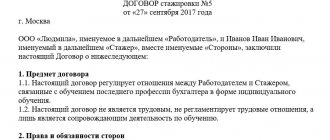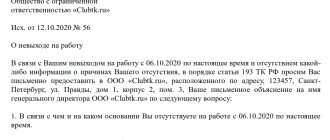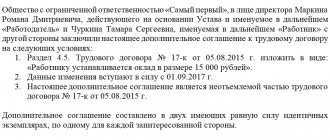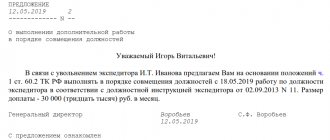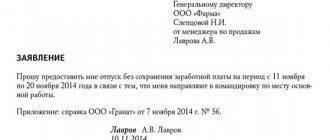Increasing the scope of work in accordance with the Labor Code of the Russian Federation
Increasing the volume of work involves assigning an employee work in his own specialization. It is assumed that this work is not specified in the original employment contract. The procedure is regulated by Article 60.2 of the Labor Code of the Russian Federation. Additional load is assigned if the following conditions are met:
- No separation from core activities.
- Performing duties within the standard working hours (based on Part 1 of Article 60.2 of the Labor Code of the Russian Federation).
Article 60.2 of the Labor Code of the Russian Federation stipulates additional conditions for increasing the scope of work:
- Obtaining written consent from the employee.
- Carrying out activities in another or original position.
- The manager is obliged to pay the employee extra for additional assignments.
An increase in the scope of work is introduced based on the worker’s application.
IMPORTANT! The employer needs to know what exactly is meant by an increase in the volume of work. As part of this procedure, the manager can assign an employee work performed within the boundaries of his position, the volume of which is greater than standard. If the worker is assigned another job, the design will be slightly different. For example, in case of internal part-time work, the employer needs to draw up an additional employment contract.
DIFFERENCES IN EXPANDING SERVICE AREA AND INCREASING THE VOLUME OF WORK
Expanding service areas and increasing the volume of work means performing, along with one’s main work stipulated by an employment contract, an additional amount of work in the same profession or position, that is, performing homogeneous work (for a similar position, specialty, qualification).
At the same time, the concept of “expansion of service areas” for the purpose of applying Articles 60.2 and 151 of the Labor Code of the Russian Federation includes the assignment of additional work for the same position, the work for which is made dependent on zones or areas, and with an increase in the volume of work - on production standards.
The clarifications of the State Labor Inspectorate in the Chelyabinsk Region dated November 21, 2017 indicate that the main difference between expanding service areas and increasing the volume of work is that expanding the service area is established when a position requires the presence of zones or areas (for example, a social worker, a doctor, a cleaner) . And when the volume of work increases, in addition to the main work, the employee is entrusted with similar additional work, that is, the volume of previously performed work increases (for example, a mechanic for mechanical assembly work).
For clarity, let's summarize these differences in a table:
The table shows that the rest of the registration of additional work is the same both when expanding service areas and when increasing the volume of work: you need to enter into an agreement with the employee, adhere to the rule of equal pay for work of equal value, and there is no need to keep separate records of working time for additional work.
[…] The concept of “expanding service areas” is not considered by the legislator separately, but only in conjunction with “increasing the scope of work”, therefore, in order to avoid possible mistakes, it is worth noting the differences. Expanding service areas involves assigning additional responsibilities to jobs with clear boundaries. The main difference between expanding the service area and increasing the scope of work is that the expansion of the service area is established when the position requires the presence of zones or areas (for example, a social worker, a doctor, a cleaner). Increase in the volume of work - in addition to the main work, the employee is entrusted with similar additional work, that is, the volume of previously performed work increases. Thus, expanding the service area is more often used for workers who are assigned areas - doctors, electricians, while increasing the volume is more likely applicable for workers who have a production standard. In accordance with Part 2 of Art. 60.2 of the Labor Code of the Russian Federation, additional work entrusted to an employee along with the work specified in the employment contract can be performed by him in the order of combining professions (positions), by expanding service areas, increasing the volume of work, or in connection with the assignment of duties to a temporarily absent employee. In this case, the employer can entrust the employee with performing such additional work only with his written consent and for an additional fee (Part 1 of Article 60.2 of the Labor Code of the Russian Federation). When expanding service areas or increasing the volume of work, the employee performs work in the same profession or position, which is stipulated by the employment contract, but to a greater extent compared to what he previously performed in accordance with the employment contract. The law does not provide for a limitation on the period for which an employer can assign an employee to perform additional work along with his main job. In each specific case, the period during which the employee will perform, along with the work specified in the employment contract, additional work by expanding service areas, increasing the volume of work, is determined by the employer with the consent of the employee (Part 3 of Article 60.2 of the Labor Code of the Russian Federation). If the employee does not agree with the period determined by the employer, this period may be determined by agreement of the parties. If the parties cannot agree on the period during which additional work must be performed, the employee has the right to refuse to perform it. According to Part 4 of Art. 60.2 of the Labor Code of the Russian Federation, the employee has the right to refuse to perform additional work ahead of schedule, and the employer has the right to cancel the order to perform it ahead of schedule, warning the other party about this in writing no later than three working days. At the same time, as follows from the content of this norm, neither the employee nor the employer is required to indicate the reason why they prematurely refuse the agreement to perform additional work. When expanding service areas or increasing the volume of work, it is necessary to pay attention to the quantitative component of the labor function. This is important for both the employee and the employer. Firstly, the employer must determine the amount of additional payment for expanding the service area or increasing the volume of work, which is determined by the norms of labor legislation (Article 151 of the Labor Code of the Russian Federation). So, in accordance with Part 2 of Art. 151 of the Labor Code of the Russian Federation, the amount of additional payment established by agreement of the parties to the employment contract depends on the content and (or) volume of additional work. At the same time, it is necessary to take into account that, in accordance with Part 2 of Art. 22 of the Labor Code of the Russian Federation, the employer is obliged to provide employees with equal pay for work of equal value. Secondly, the employee must know what functions he is obliged to perform, since by virtue of Art. 60 of the Labor Code of the Russian Federation, it is prohibited to require an employee to perform work not stipulated by the employment contract. The exception is cases strictly provided for by the Labor Code of the Russian Federation and other federal laws. […] Failure to provide additional payment when expanding service areas and increasing the volume of work performed, or engaging an employee in such work without his written consent are violations of labor legislation and entail administrative liability under Part 1 of Art. 5.27 of the Code of the Russian Federation on Administrative Offences. Prepared on the basis of material by I. A. Vasiliev, 1st class adviser to the state civil service of the Russian Federation. State Labor Inspectorate in the Chelyabinsk Region 11/21/2017
Rules for registration of additional work
IMPORTANT! A sample order for establishing additional payment to an employee for increasing the amount of work from ConsultantPlus is available at the link
In order to correctly process the additional payment, you need to correctly document the increase in the scope of work. Each stage involves drawing up a corresponding document.
Application for increasing the scope of work
The application is drawn up in a standard form: “header”, title, text itself, date and signature. Let's take a closer look at the list of information that needs to be included in the document:
- Manager's position and place of work.
- Full name of the head.
- The employee's position and full name.
- Title of the application (“on consent to perform the work”).
- Request for an increase in the scope of responsibilities.
- Content and scope of work, duration of their implementation.
- Amount of surcharge.
At the end of the application there must be the position of the manager and his signature.
How to specify the condition on the amount of additional payment in an additional agreement to an employment contract on increasing the volume of work?
Service memo
Based on the application, a memo is drawn up. It is sent from the head of the company to the director. Let's consider the information that needs to be mentioned in the memo:
- The title of the manager's position, his full name, and the name of the company.
- The employee's position and full name.
- Document's name.
- A request to assign additional work to an employee and its justification (for example, one of the employees going on vacation).
- A request for additional payment in the established amount.
- The position of the sender of the note and his signature.
The form of the memo is also not established by law.
Order on the introduction of work and additional agreement
After receiving consent from the employee, an agreement should be drawn up, which is attached to the employment contract. The document contains the following information:
- The content of the work.
- The period of its introduction.
- Amount of surcharge.
Based on this agreement, an order is drawn up. It contains the following data:
- Name of the organization.
- The name of the document and its number.
- Date of preparation.
- An order to assign additional work with reference to the relevant articles of the Labor Code of the Russian Federation (in particular, articles 60.2, 151).
- Manager's signature.
The employee must be familiarized with the order and signed. Without this, the document will not be valid.
Who can do additional work and how?
The Labor Code of the Russian Federation allows for additional work at the enterprise. A similar principle is spelled out in Art. 60 of the specified legal acts. Additional work occurs during the duration of the work shift within the organization, as stated by law.
In connection with this possibility, regulated in the labor legislation in force in Russia, there are three fundamental forms of additional work:
- combination of professions and positions;
- expanding the service area and increasing the scope of work;
- performing the duties of an employee who is temporarily absent from the workplace in the organization.
The choice of one form or another, as well as the amount of payment for additional work, depends primarily on the circumstances that force one to enter into an agreement with employees to attract them to work.
How to determine the amount of surcharge?
The amount of additional payment is determined, as a rule, on the basis of an oral agreement between the employer and employee. The legality of the agreement between participants in the labor process is established by part 2 of article 151 of the Labor Code of the Russian Federation. When calculating the amount, the following factors are taken into account:
- Content and scope of new responsibilities (Article 151 of the Labor Code of the Russian Federation).
- Qualification of the employee, complexity of the work, volume of work and its conditions (Articles 129, 132 of the Labor Code of the Russian Federation).
- The obligation to introduce equal pay for work of equal value (paragraph 6, part 2, article 22 of the Labor Code of the Russian Federation).
The surcharge can be entered either as a flat amount or as a percentage. The law is silent on the exact amount of (minimum/maximum) remuneration.
Question: How to reflect a one-time payment to an employee for an increase in the volume of work and service areas: as a bonus or as an additional payment? How to apply for such a job? Is it included in income tax expenses? View answer
Combination of professions and positions
The combination of professions is regulated by Article 60 of the Labor Code of the Russian Federation. This article provides a full-fledged concept of this form of attracting organization employees to additional work.
Thus, combining professions and positions is work, the scope of which does not contain an employment contract concluded with an employee, but is performed by the subject of legal relations in the organization for another position or profession for an additional payment (fee).
Combining professions (positions) has characteristic features and principles:
- the legislative procedure provides for an agreement between the employer and the employee of the organization to combine professions;
- the time that the employee will spend on additional work is regulated by agreement of the parties (this may be a temporary period until a qualified employee is selected for the vacant position);
- combining professions and positions must be carried out within the boundaries of one organization, otherwise we will be talking about external part-time work;
- the performance of work that determines the agreement of the parties must be carried out during the work shift (otherwise the work will be considered as internal part-time work).
Drawing up an agreement in connection with the need to involve an employee in additional work can be carried out in several different ways:
- if an agreement on combining positions is concluded (see Article 60.2 of the Labor Code of the Russian Federation);
- if an internal part-time contract is concluded;
- if an additional agreement is drawn up, that is, a civil contract will be signed.
Each of the listed forms has both its advantages and disadvantages. The choice of one of the forms of cooperation depends on specific circumstances. In some situations, internal part-time work will be acceptable, while in others a combination of professions will be suitable. For example, if it takes a long time to complete a new job.
Internal part-time work involves payment for the amount of work performed in the time free from the main employment of the position.
In this case (if internal part-time work is chosen to formalize the relationship), the Labor Code obliges the employer to enter into an additional agreement with the employee. The labor legislation of the Russian Federation also provides for additional payment for combining positions, as well as internal part-time work. The size is determined, in particular, by the order to combine positions, as well as the employment contract between the employee and the employer, issued within the boundaries of one organization. In addition, there is also an additional payment for combining professions (two, three - it doesn’t matter).
How to remove additional payment for increasing the volume of work?
To remove the additional payment, you need to remove the employee’s responsibilities for performing the assigned work. The manager needs to issue an order to stop accrual of remuneration. Based on this document, the accounting department stops payments.
IMPORTANT! The increase in the scope of work can be stopped after the deadline for its introduction has expired. For example, an employee is assigned additional responsibilities for the period from June 1 to June 20. Payments stop on June 21. The manager must draw up an order in any case.
The increase in the scope of work may be terminated early. The formalization of this depends on whose initiative the termination of the previous agreement occurred. If this is the initiative of the worker, then a statement is drawn up, if the initiative of the employer is a notification, which must be familiarized to the employee against signature. The document is sent to the interested party three days before the load is reduced. For example, if it is expected that the employee’s duties will be removed on July 23, the application must be sent on July 20.
Commentary to Art. 60.2 of the Labor Code of the Russian Federation
Comments on articles of the Labor Code will help you understand the nuances of labor law.
§ 1. This article was introduced into the Labor Code by the Federal Law of June 30, 2006.
Combination of professions (positions) is the performance by an employee in the same organization, along with his main job stipulated by the employment contract, of additional work in another or the same profession (position). Such work is performed for an additional fee (see Article 151 of the Labor Code and the commentary thereto).
§ 2. The legislator provides that additional work assigned to an employee in another profession (position) can be carried out by combining professions (positions).
§ 3. The performance by an employee, along with his main job, of an additional amount of work in the same profession (position) is considered as an expansion of service areas or an increase in the volume of work performed.
§ 4. The commented article allows the performance of the duties of a temporarily absent employee without release from the main job, when the employee may be assigned additional work in either another or the same profession (position). For example, due to illness, vacation, business trip and other reasons, when a place (position) is reserved for him.
§ 5. The period during which the employee will perform additional work, the content, and volume of work can be established by the employer with the written consent of the employee. This is formalized by order (instruction) of the employer.
§ 6. In accordance with Part 4 of Art. 60.2, the employee has the right to refuse to perform additional work ahead of schedule, and the employer has the right to cancel the order to perform it ahead of schedule. In this case, the employer must notify the employee in writing no later than three working days in advance.
Additional questions
Is information about the increased workload entered into the employee’s work book? No, you do not need to provide any additional information. This is relevant even if the employee combines several positions at once.
Is it possible to introduce an increase in the scope of work without additional payment? This is only possible if the corresponding provision is contained in the employee’s job description. For example, the document may indicate that the employee must perform the functions of an employee going on vacation without receiving remuneration. In this case, the absence of additional payments will be completely legal. This is due to the fact that the employee will perform work within the framework of the concluded contract. The corresponding rule is in the Letter of the Ministry of Health and Social Development dated March 12, 2012 No. 22-2-8970.
IMPORTANT! If the job description does not oblige the employee to completely replace an absent employee, a partial additional payment may be established.
If the employee does not agree to the additional workload
It is impossible to force someone to take on other people's responsibilities, but the problem with personnel and distribution of tasks must somehow be solved. In this case, a fixed-term employment contract can save you (Article 59 of the Labor Code of the Russian Federation).
In this situation, we are talking about concluding a fixed-term contract with a new employee. That is, the employer has the right to conclude not an open-ended employment contract with a new employee, but a fixed-term employment contract for the duration of the absence of the main employee. By the way, it is not prohibited to conclude such an agreement with those employees who continue to work; perhaps this option will suit them better. In one of the upcoming articles we will talk about the nuances of drawing up a fixed-term contract.
Employer's liability for lack of payments
The employer, unless otherwise provided by law, is obliged to pay additional payments to employees. If he does not do this, he can be brought to administrative responsibility. In particular, the employer is issued a fine in the amount of 1,000-5,000 rubles. The amount of the fine is established by Article 5.27 of the Code of Administrative Offenses of the Russian Federation.
How to hold an employer accountable? You can contact the labor inspectorate. Upon the employee's application, the company is checked. An alternative option is to file a claim in court. The second option is more preferable. When contacting the labor inspectorate, you need to understand that the inspection will not be carried out immediately. As a rule, it is carried out within a month. During this period, the conflict that has arisen may no longer be relevant. Moreover, it is quite difficult to detect an offense during an audit.
Basic moments
In case of production necessity, the employer has the right to involve the employee in additional work. The Labor Code of the Russian Federation provides three ways for an employee to perform additional work without exemption from the main one:
- combination of positions;
- increase in the volume of work;
- fulfilling the duties of a temporarily absent colleague.
Additional duties are performed under the following conditions:
- without interrupting your main job;
- during the established working hours (Part 1, Article 60.2 of the Labor Code of the Russian Federation).
To issue an order to assign additional work to an employee under Art. 60.2 of the Labor Code of the Russian Federation, consider several rules:
- the employee provided written consent;
- the activity relates to a different or similar position;
- labor is paid additionally.
The employee’s consent can be formalized as follows:
But first, the employee’s immediate supervisor sends a notice to the director of the enterprise about the situation that has arisen and the need to temporarily transfer responsibilities to one of the employees.
If the employee agrees to additional work, not only a sample order to increase the volume of work for the same position is drawn up, but also an additional agreement to his employment contract. It states:
- what needs to be done and for what period;
- amount of surcharge;
- the period during which a citizen works under new conditions.
Based on the concluded agreement, using a sample order for additional payment for additional work, the employer issues an order for the temporary performance of additional duties. The employee must be familiarized with the document and signed.
We suggest taking our sample order for additional payment for an increase in the amount of work as a basis and modifying it to suit your needs.
What is a surcharge
An additional payment is a payment that is in the nature of compensation, since it is assigned when the employee was in a state of increased work intensity (for example, worked on a holiday or day off, or combined activities with the work of an absent employee).
When an employee performs duties not provided for in the employment contract (for example, combining several positions or working overtime), in accordance with the law, the employer must pay additionally, compensating for the complexity of the work or the time spent.
Additional payment is also necessary for work in dangerous or harmful conditions, as well as when transferring an employee to a position that is lower paid.
Let us consider in detail additional payments for labor when combining professions (positions), expanding service areas, increasing the volume of work, or performing the duties of a temporarily absent employee without release from work specified in the employment contract.

